An international outcry has followed Russia's shelling of a nuclear power plant in Ukraine overnight. The IAEA says the reactor itself was not hit and no radiation was released.
The Ukrainian representative at the UN Sergiy Kyslytsya accused Russia of "an act of nuclear terrorism", dismissing his Russian counterparts' claims of domestic sabotage as "lies".
An international outcry followed after Russian forces launched an attack on Ukraine and Europe's largest nuclear power plant. The Zaporizhzhia site, now under Russian control, is said to be stable.
Earlier in the day, NATO's secretary-general has repeated that the military alliance will not get involved on the ground in Russia's war in Ukraine, or impose a no-fly zone.
Ukraine and Russia have agreed "in principle" to establish corridors for civilians to leave combat zones safely, and for ceasefires to operate while they make the journey.
See our live blog below for the latest updates:

 ${title}
${title}
Live ended
Friday's key points:
- An international outcry has followed Russia's attack on Europe's largest nuclear power station. Ukraine's President Zelenskyy accused Moscow of "international terrorism".
- The shelling at the Zaporizhzhya plant did not damage a reactor, and radiation levels are normal. But Ukrainian authorities reported three deaths and two injuries in the attack. There are safety concerns over Ukraine's other nuclear plants.
- NATO Secretary-General Jens Stoltenberg says the military alliance will not police a no-fly zone over Ukraine, warning that such a move could bring a wider war in Europe.
- Moscow has cranked up the repression of free speech as Putin seeks to control how his Russian war in Ukraine is reported. Terms like "war" and "invasion" are banned and falling foul of the new law is punishable by up to 15 years in jail. Access to major foreign media is being restricted.
- The southern port of Mariupol was "partly under siege" as Ukrianian forces resisted Russian attacks, a presidential adviser said. They have also held off Russian assaults on Mykolaiv and Odessa, he added.
- Elsewhere, battles have continued northwest of Kyiv and heavy strikes have hit Kharkiv and Okhtyrka. Ukrainian forces were said to be still holding Chernihiv in the north.
- Russian state media regulator Roskomnadzor blocked access to Facebook in the country for its restrictions on RT and state-controlled media content.
Russia committed 'act of nuclear terrorism', Ukrainian diplomat says
Ukraine's representative at the UN is accusing Russia of committing "an act of nuclear terrorism" by attacking the country's largest nuclear power plant.
He dismissed his Russian counterpart's claim that a "Ukrainian sabotage group" was responsible for setting fire to a training facility at the plant as "lies".
Ambassador Sergiy Kyslytsya told an emergency meeting of the UN Security Council on Friday that as a result of Russian shelling on the Zaporizhzhia nuclear plant grounds, a fire broke out, killing and injuring several people.
He said the plant is currently under the control of the Russian armed forces, and "it is alarming that several employees responsible for maintaining nuclear security at the site have reportedly been killed by Russian soldiers," and "there has been no rotation of personnel since yesterday morning."
While there have been no changes in radiation levels, Kyslytsya said several buildings are damaged, and the telephone connection to the plant "is disrupted and not available at the moment."
Kyslytsya accused Russia of deliberately attacking the nuclear power site in violation of numerous international agreements and said Russian Ambassador Vassily Nebenzia, who blamed a "Ukrainian sabotage group," may not be adequately informed by his government.
Russian authorities block access first to Facebook, then Twitter
Russia’s state communications watchdog has ordered to completely block access to Twitter on Friday night, after blocking Facebook in Russia earlier in the day amid the tensions over the war in Ukraine.
The agency, Roskomnadzor, said Friday it decided to cut access to Facebook over its alleged “discrimination” of the Russian media and state information resources. It said the restrictions introduced by Facebook owner Meta on the RT and other state-controlled media violate Russian law.
A week ago, the watchdog announced “partial restrictions” on access to Facebook that sharply slowed it down, citing the platform’s moves to limit the accounts of several state-controlled Russian media. Facebook and Twitter have played a significant role in amplifying dissent in Russia in recent years.
The move against Facebook follows the blocks imposed Friday on the BBC, the US government-funded Voice of America and Radio Free Europe/Radio Liberty, German broadcaster Deutsche Welle and Latvia-based website Meduza as the government seeks to uproot independent sources of information about the invasion of Ukraine.
Russia finds Turkish proposal for Moscow and Kyiv top diplomat talks "acceptable"
Russian ambassador to the United Nations in Geneva welcomed Turkey's initiative to organise a Ukraine-Russia meeting, domestic media reported on Friday.
"Moscow considers it an acceptable idea for Turkey to organise a meeting of the foreign ministers of Russia and Ukraine," Gennady Gatilov stated.
Turkey, which has close relations with both Ukraine and Russia, has been calling for a cease-fire to end the fighting.
Turkish Foreign Affairs Minister Mevlüt Çavuşoğlu proposed on Friday that his Russian and Ukrainian counterparts, Sergey Lavrov and Dmytro Kuleba, should meet at a diplomatic forum in Antalya.
President Recep Tayyip Erdogan has held separate calls with Ukrainian President Volodymyr Zelenskyy and British Prime Minister Boris Johnson to discuss the situation in Ukraine.
Erdogan told Johnson that Turkey would continue to strive for an immediate cease-fire as well as an immediate end to Russia’s actions on Ukraine, according to a brief statement released from his office.
Erdogan and Zelenskyy discussed “Russia’s attacks and the latest developments” in Ukraine, his office said in a separate statement but did not elaborate.
Macron to propose measures to protect Ukraine's nuclear powerplants
The French president is "extremely concerned about the risks" to nuclear security "resulting from the Russian invasion" and will propose concrete measures in the coming hours to ensure the safety of Ukraine's five nuclear sites, the Elysée announced on Friday.
Russia and Ukraine are expected to "find an agreement" based on Macron's proposals derived from IAEA criteria to "together ensure the preservation of the security" of these sites, the French presidency added in a statement.
'Don't turn a blind eye," Zelenskyy tells protesters across Europe
Ukrainian President Volodymyr Zelenskyy called on the European nations to support his country's fight against the invading Russian military.
Zelenskyy appeared on video as he addressed thousands of people protesting the war in several European cities, naming among them Paris, Prague, Lyon, Frankfurt and others. He asked the big crowds not to be silent about what is going on in his country.
"Don't turn a blind eye on this," he said. "Come out and support Ukraine as much as you can," he said through a translator.
"If we fall, you will fall," he said.
"And if we win, and I'm sure we'll win, this will be the victory of the whole democratic world, this will be the victory of our freedom, this will be the victory of light over darkness, of freedom over slavery."
"And if we win we will become as blossoming as Europe. And Europe will be flourishing more than ever," he said.
"All of you are Ukrainians today, thank you for this."
G7 ministers: 'We will hold those responsible for war crimes accountable'
'I lost my home, I lost my normal life, I had a job... Now I need to run from my country'
UN says 1.2 million refugees have fled Ukraine
The UN refugee agency reported Friday that more than 1.2 million people have left Ukraine since the fighting began.
More than 165,000 people left the country on Thursday — down slightly from Wednesday’s count and well under the nearly 200,000 on Tuesday, which amounted to the peak one-day outflow of people from Ukraine since the conflict began, according to the United Nations High Commissioner for Refugees.
Its data portal on Ukraine showed that the majority — about 650,000 — had gone to neighbuoring Poland, and roughly 145,000 had fled to Hungary. Another 103,000 were in Moldova and more than 90,000 in Slovakia.
UNHCR spokesperson Shabia Mantoo said “we know that the majority are women, children and the elderly,” but she was unable to provide a more specific breakdown by age or gender. (AP)
Tension in between the blasts as we wait for more, Kharkiv resident tells Euronews
EU 'ready for new sanctions' against Putin, says Von der Leyen
"We are determined, we are united," she said in Brussels, alongside US Secretary of State Antony Blinken.
Watch: Euronews Tonight
Watch euronews TV Live - Television live broadcast | Euronews
Follow the news live on euronews.com – Breaking news, latest news updates, international news, stay informedRussian lawmaker speaks out over heavy losses
A Russian lawmaker has spoken out about what she says are heavy losses being suffered by some military units fighting in Ukraine.
Lyudmila Narusova, a member of Russia’s upper house of parliament, the Federation Council, said during Friday's livestreamed proceedings that she knew of one company which was meant to be 100 strong but “only four were left alive” when the unit was withdrawn.
Narusova, the widow of President Vladimir Putin’s former political mentor Anatoly Sobchak, did not present evidence for her claims and said the Defence Ministry had refused her request to confirm the reported casualties.
Russia said Wednesday 498 of its troops had been killed in Ukraine and has not updated that number since. Ukraine claims that the true number of Russian casualties is some 9,000. The figures cannot be verified. (with AP)
Novaya Gazeta 'removing content' after new law is passed
"The law sanctioning "fake news" on the actions of the Russian armed forces has entered into force (...) we are obliged to remove a lot of content. But we have decided to continue working," the newspaper announced on Friday.
BBC to withdraw journalists from Russia amid information clampdown
Ukraine's Winter Paralympic team attend opening ceremony in Beijing
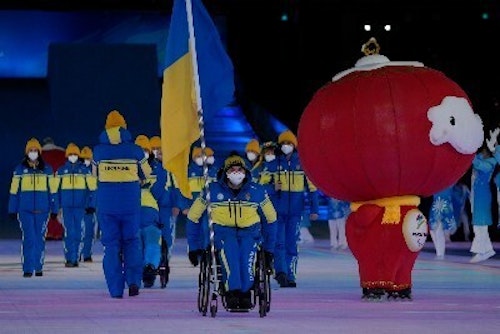
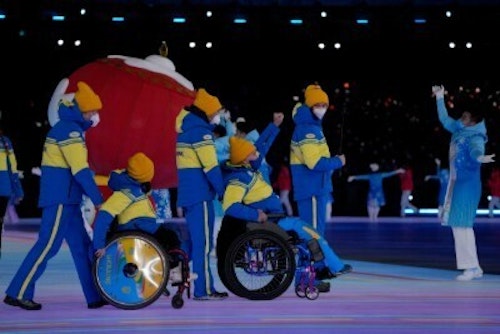
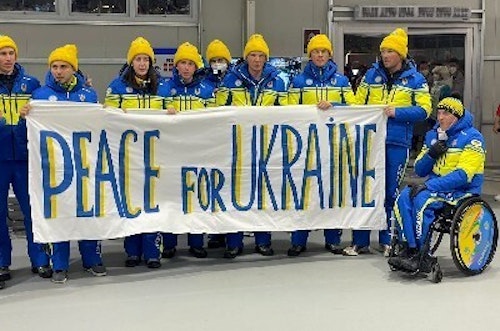
Calls for special tribunal to prosecute Putin
The Ukrainian government and a former British prime minister are pushing for a special criminal tribunal to prosecute Russian President Vladimir Putin and his allies over the invasion of Ukraine.
Former Prime Minister Gordon Brown said the call for a body to investigate the “crime of aggression” was based on the tribunals that prosecuted senior Nazis after World War II.
The Netherlands-based International Criminal Court is already investigating allegations that Russia has committed war crimes in Ukraine. But while it can investigate genocide, crimes against humanity and war crimes, Russia has not signed up to a separate ICC statute under which nations pledge not to commit “crimes of aggression.”
Brown said that “this act of aggression by Russia … cannot go uninvestigated, unprosecuted and unpunished.”
He said the Russian president “must not be able to escape justice.”
Ukrainian Foreign Minister Dmytro Kuleba welcomed the call for a tribunal, which is backed by legal experts and academics from around the world.
“We are fighting against an enemy who is much stronger than us. But international law is on our side,” Kuleba told a meeting in London by video link from Ukraine. (AP)
Vladimir Putin 'totally isolated', says former Finnish prime minister
Bulgarians offer food, shelter and transport to Ukrainians fleeing war
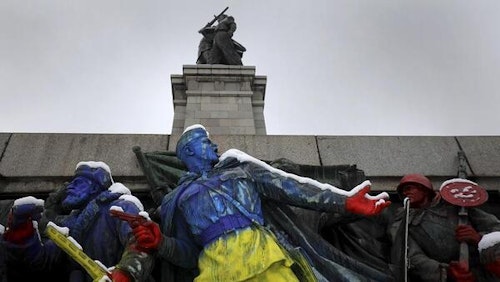
Bulgarians offer food, shelter and transport to Ukrainians fleeing war
Rumen Sarandev couldn't offer his house to those fleeing the bloodshed - so he offered his car. #UncoveringEuropeUN Security Council to hold emergency meeting
The UN Security Council has scheduled an emergency open meeting on the attack on Ukraine’s largest nuclear power plant.
The meeting, to be held at 1630GMT (1730 CET) Friday, was requested by the United States, United Kingdom, France, Ireland, Norway and Albania.
Council diplomats said the International Atomic Energy Agency (IAEA) will brief council members. Russia’s shelling of Europe’s biggest nuclear plant in Ukraine received widespread international condemnation on Friday.
The shelling at the Zaporizhzhia plant in Enerhodar had touched off a fire that was extinguished. Ukrainian authorities said
Russian forces have taken control of the site.
Russian attacks in Ukraine: latest on-the-ground reports
In the centre of the capital of Kyiv, frequent shelling could be heard Friday, although more distant than in recent days, with loud thudding every 10 minutes resonating over the rooftops.
Battles involving airstrikes and artillery continued Friday northwest of Kyiv and the northeastern cities of Kharkiv and Okhtyrka came under heavy strikes, Ukrainian presidential adviser Oleksiy Arestovich said.
He said Ukrainian defense forces were still holding the northern city of Chernihiv, and had prevented Russian efforts to take the important southern city of Mykolaiv. Ukrainian artillery defended Odesa from repeated attempts by Russian ships to fire on the Black Sea port, Arestovic said.
Overall, the outnumbered, outgunned Ukrainians have put up stiff resistance, staving off the swift victory that Russia appeared to have expected.
But in a sign of how much pressure they are under, Ukraine’s defense minister said Friday that the flagship of its navy was scuttled at the shipyard where it was undergoing repairs to keep it from being seized by Russian forces.
“It is hard to imagine a more difficult decision for a courageous soldier and crew,” said Oleksii Reznikov.
Another strategic port, Mariupol on the Azov Sea, was “partially under siege,” and Ukrainian forces were pushing back efforts to surround the city, Arestovich said Friday.
“The humanitarian situation is tense,” he told reporters, adding that Ukrainian authorities are in talks with Russian representatives and international organizations to set up humanitarian corridor to evacuate residents and supply food.
Battles have knocked out the city’s electricity, heat and water systems, as well as most phone service, officials said. Food deliveries were also cut. (AP)
France and Germany enabled Russia's invasion of Ukraine, analyst argues in op-ed
Annika Hedberg argues in an op-ed for Euronews that Germany and France carry a particular responsibility in playing into Vladimir Putin’s hand.
"The EU has enabled Russian aggression and, ultimately, the unjustified war against Ukraine. Guided by Germany and France, the EU has endangered the future of the entire European continent. The level of incompetence, short-sightedness, greed and corruption that has driven them, and other EU member states, is flabbergasting," writes Hedberg, who is the head of the sustainable prosperity for Europe programme at the European Policy Centre.
"It is now blatantly evident that the EU has been sleepwalking for more than a decade," she wrote.
NATO rejects no-fly zone over Ukraine, Stoltenberg says
He added that while NATO allies were stepping up their support and implemented severe sanctions on Russia, they wanted to prevent escalation.
"We have a responsibility as NATO allies to prevent this war from escalating beyond Ukraine because that will be even more dangerous, more devastating and will cause even more human suffering," he said.
The only way to implement a no-fly zone would be to send NATO planes into Ukrainian airspace to shoot down Russian places, he said.
Stoltenberg said a no-fly zone and the involvement of NATO in the conflict could start "a full-fledged war in Europe involving many more countries and causing much more human suffering".
Watch live as NATO Secretary-General Jens Stoltenberg gives a press conference on the situation in Ukraine
Navalny's team call on people to join anti-war protests
Kremlin calls on Russians to unite around Putin
"This is not the time to divide, it is the time to unite. And unite around our president," Kremlin spokesman Dmitry Peskov told a press briefing, asked about calls from anti-war cultural figures.
Russia restricts access to foreign and independent media including local BBC
Russia has restricted access to the sites of four independent media, including the local edition of the BBC, further tightening its control on information a week after launching a full-scale invasion of Ukraine.
The Russian-language editions of the BBC and Deutsche Welle will be limited in addition to the independent website Meduza and Radio Svoboda, the Russian branch of RFE-RL, according to the Russian media regulator.
Poles worried about radioactive material release
Poland’s pharmaceutical authorities say customers are asking whether they should take iodine to protect against radiation, after a nuclear plant in neighboring Ukraine was targeted by invading Russian troops.
Tomasz Leleno, spokesman for Poland’s Main Pharmaceutical Chamber, said Friday that pharmacists and doctors are advising against that, because iodine may cause more harm than good if used without consulting a doctor.
The United Nations atomic watchdog said there has been no release of radiation at the Zaporizhzhia nuclear plant after a building on the site was hit by Russian shelling.
But the development has alarmed Poles. Sale of iodine solution had already surged last week, after Russian troops took control of Ukraine’s idled Chernobyl nuclear plant, where there was an accidental meltdown in 1986.
After Chernobyl, many people in Poland, especially the young, took iodine, as some experts claimed it could shield against radiation.
UN Human Rights Council votes to probe violations in Ukraine
EU ending 'research cooperation with Russia': Commissioner
Rada approves draft bill on 'On Ensuring the Participation of Civilians in the Defense of Ukraine'
Bombings of nuclear plants 'dangerous and unacceptable': France
'Situation very difficult to sustain' at Ukrainian nuclear plants: IAEA chief
IAEA chief says ready to travel to Chernobyl 'as soon as possible'
Reactors at Zaporizhzhya nuclear plant not affected by shelling: IAEA
Duma passes bill to criminalise "fake news" against invasion
Ukraine says over 9,000 Russian troops killed
Attack on nuclear plant shows 'recklessness': NATO chief
Russian parliament approves harsh sentences for 'fake news' about the army
This amendment, adopted at third reading by the Duma, Russia's lower house of parliament, could see individuals imprisoned for up to 15 years if their "false information" has "serious consequences" for the armed forces.
China "seriously concerned" after Russian attack on nuclear power station
Foreign Ministry spokesperson Wang Wenbin told reporters Friday that China will continue to follow developments at the Zaporizhzhya plant in the city of Enerhodar and “calls on all parties concerned to maintain calm and restraint, prevent further escalation of the situation and ensure the safety of the nuclear facilities concerned.”
“China attaches great importance to nuclear safety and is seriously concerned about the safety and security situation of nuclear facilities in Ukraine,” Wang said.
Russian oil struggles to find buyers
For now, Western sanctions against Russia have taken pains to avoid the energy sector, which is crucial for Europe: Germany, for example, imports 55% of its gas from Russia. For oil, Russia is the world's second largest exporter, behind Saudi Arabia.
Along with the risk of governments changing their minds on energy sector sanctions, analysts point to the possibility of public condemnation of importers.
In northern Europe, Finland's state-owned fuel company Neste says it has "has almost entirely replaced Russian crude with other sources, in particular from the North Sea" in its refinery; while Swedish bitumen specialist Nynas has also announced that it will "stop purchasing raw materials of Russian origin".
Australia freezes millions in Russian money
Foreign Minister Marise Payne on Friday declined to identify the institution or who owned the money.
Australia has imposed sanctions against more than 350 Russian individuals including President Vladimir Putin. Australia has also targeted with sanctions 13 Belarus entities and individuals including Defense Minister Viktor Khrenin.
What you need to know about Europe's biggest power station
City of Okhtyrka without heat or electricity after Russian air strike
“We are trying to figure out how to get people out of the city urgently because in a day the apartment buildings will turn into a cold stone trap without water, light or electricity,” Dmytro Zhyvytskyy said.
Atomic Energy Agency to hold briefing on Ukraine nuclear power station attack
Helsinki train is a rare exit route for Russians to Europe
Traveling "is difficult now because everything is canceled", explains Beata Ioukhtanova, her friend who studies with her in the French capital. The pair will now continue their journey by plane.
During the pandemic, the "Allegro" services which are jointly operated by Finnish and Russian train companies were suspended for long periods of time, and then only partly full once services resumed.
"Everyone was saying 'I don't know what to do'" says Maria as she got off the train.
"We first thought we should go through Turkey, but it's much more expensive than Finland, so we're in luck."
VR would like to open the Allegro connection to other European Union nationalities, and to increase capacity.
"We know that there are tens of thousands of EU citizens still in Russia and we assume that many of them would like to return home," says Mr Simola.
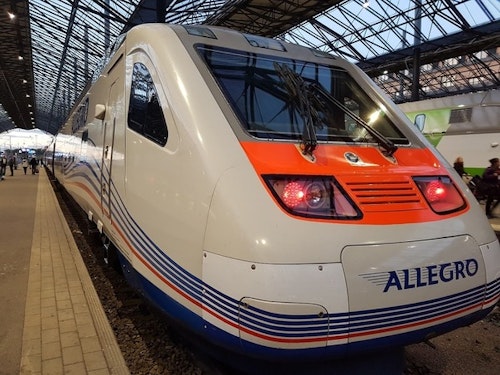
Russian authorities tighten grip on Facebook
Russia shells Ukraine nuclear plant in overnight attack
Trudeau described the attack on the nuclear facility "horrific" and "unacceptable" while Johnson said the Russian attack was "reckless."
US Energy Secretary Jennifer Granholm tweeted that the Zaporizhzhya plant’s reactors were protected by robust containment structures and were being safely shut down.











